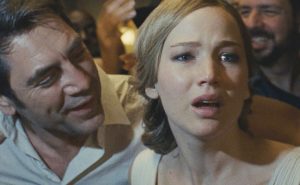From his debut feature, PI, Darren Aronofsky’s work has never strayed far from the metaphysical. There was the overt Kabbalah that infused NOAH, and even REQUIEM FOR A DREAM was as much about the psychic destruction of souls as it was about any physical degradation of the protagonists. And so it is with MOTHER!, an opus that starts with the face a woman in flames staring at us with fearless defiance as her skin chars and falls away. Cut to a chunk of glass, rutilated with gold, spotlighted in an otherwise dark space being lovingly placed on a small pedestal. It makes little sense now, but will in the fullness of time.
The next scene is jarring for its very placidity. Jennifer Lawrence, identified only as Mother in the credits and by no name at all in the course of her coming adventures, wakes to the other half of her bed empty. The colors are muted and pale. The sounds are that of a bucolic setting and a large house settling. The empty space had been occupied by Javier Bardem, identified only at Him in the credits, and only as the Poet throughout the story. He is suffering writer’s block after a distinguished career, and she is tenderly rebuilding his home, which was destroyed in a fire, and rebuilding him, too, with her unconditional love. Into their octagonal mansion in the middle of nowhere arrives the Doctor (Ed Harris), who has mistaken the edifice for a bed & breakfast. To Mother’s dismay, the Poet invites the total stranger to stay the night. Though her husband forms a bromance with their guest, Mother resents the invite proffered without her consent, or even consultation. She’s even more resentful at the Doctor’s wife (Michelle Pfeiffer), who arrives and quickly establishes herself as the guest from hell, prying into her host’s private lives, and violating any number of boundaries, literal and figurative. When she wants to throw them out, no one listens, much less takes her seriously, a situation that is only exacerbated as the house that she is so lovingly restoring is overrun with her husband’s fans, who treat her with indifference when they notice her at all. And the house itself begins doing peculiar things.
 What we have here is a retelling of the Garden of Eden with flourishes from the apocrypha. Aronofsky includes Mrs. God in the form of Lawrence as the devoted wife of Him. So devoted, in fact, that her entire existence revolves around refurbishing the burnt-out ruins of Him’s rambling home that she admits is too big for just the two of them. Her sole desire, as she tells one of the unwelcome guests Him has invited inside, is to create a paradise for Him. Alas, she and the home are not enough for Him, who continually prefers basking in the adoration of his fans. She is jealous, with a jealousy that smacks of that Lucifer, the light-bearer, experienced when the Almighty demanded that the angels revere humankind. And we all know how that ended.
What we have here is a retelling of the Garden of Eden with flourishes from the apocrypha. Aronofsky includes Mrs. God in the form of Lawrence as the devoted wife of Him. So devoted, in fact, that her entire existence revolves around refurbishing the burnt-out ruins of Him’s rambling home that she admits is too big for just the two of them. Her sole desire, as she tells one of the unwelcome guests Him has invited inside, is to create a paradise for Him. Alas, she and the home are not enough for Him, who continually prefers basking in the adoration of his fans. She is jealous, with a jealousy that smacks of that Lucifer, the light-bearer, experienced when the Almighty demanded that the angels revere humankind. And we all know how that ended.
While, none of the characters in the film are addressed by a proper name, you can fill in the blanks when it comes to a pair of warring brothers (real-life siblings Domhnall and Brian Gleeson), and their parents (Michelle Pfeiffer and Ed Harris), who are given to excessive PDAs as they deal the problem of mortality. Other elements may be more difficult to place. The yellow powder swirled into water, resembling the ci-mentioned rutilated glass, that Lawrence’s character swigs when her abdomen pains her, usually after an act of petty revenge is far less accessible than the smoke alarm sounding when the Doctor’s wife arrives, or the flowing goddess gown Lawrence dons at one point.
There is no faulting the performances. Lawrence, padding barefoot around the echoing halls of her expansive home, willingly submissive to her husband until it is too late to change course, has a face that registers a veritable cornucopia of even the most subtle of feelings. This is good, because the camera is attached like a lamprey to her face fully 80% of the time, often with vertiginous tracking shots that take her from room to room, conversations coming in and out of range, completing the sense of her isolation from all that surrounds her. Bemusement and affection vie for space there as her husband disappoints her at every turn while also proclaiming his undying love. A sense enhanced by Bardem’s face, which has an uncanny ability to go from tender to terrifying with the careful rearrangement of only a few key muscles. Bemusement and distaste compete on Lawrence’s face as she watches the excesses of her unwelcome guests making themselves all too at home. To watch Lawrence and Pfeiffer parry, the former a prisoner of her good manners, the latter slipping easily into sadistic delight in watcher her prey squirm, is breathtaking on a technical level.
So is everything else. It’s the resonance with the audience that is lacking. Aronofsky has given us are characters who are each, in their own  way, monster egoists. If the Poet is enthralled by a public that adores him, Mother is unwilling to share any piece of him. If Aronofsky is making a statement about the selfishness of celebrity, or the way dogma has removed a female deity from Her rightful place, he has done so by making its victim a woman with no identity of her own outside of her husband and home. You can’t shake the feeling that expecting another person to meet all one’s needs is the real original sin at the root of all humankind’s troubles. Just as one can’t help but wonder how the visual impact would have been different if Lawrence’s shell-perfect ears, featured inordinately throughout, had been less photogenic.
way, monster egoists. If the Poet is enthralled by a public that adores him, Mother is unwilling to share any piece of him. If Aronofsky is making a statement about the selfishness of celebrity, or the way dogma has removed a female deity from Her rightful place, he has done so by making its victim a woman with no identity of her own outside of her husband and home. You can’t shake the feeling that expecting another person to meet all one’s needs is the real original sin at the root of all humankind’s troubles. Just as one can’t help but wonder how the visual impact would have been different if Lawrence’s shell-perfect ears, featured inordinately throughout, had been less photogenic.
But that’s not the point of a film that, true to its internal logic, becomes more surreal as the story progresses, and the house becomes packed to overflowing with the Poet’s fans who turn their passion into a religion and the Poet into a deity. From a tantalizing start, MOTHER!’s inclusive esoterica includes an original, even invigorating, variation on the home invasion film; a gothic story in the classic Victorian mold welded uncertainly to an exploitation horror film from the 70s; and an unrestrained riff love as an invitation to the apocalypse, complete with RPGs and human sacrifice. Impeccably, even ingeniously realized, it is a thing to be admired for its visual and intellectual daring, but not something by which to be emotionally swept away.
Your Thoughts?